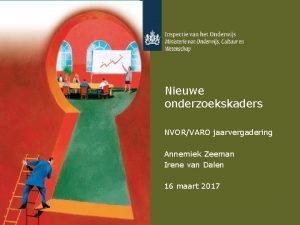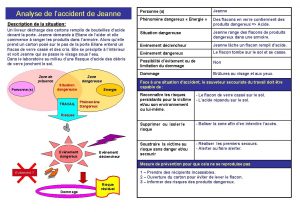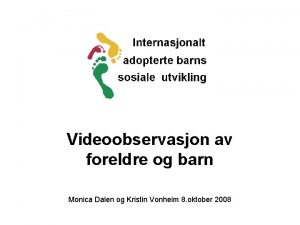Jeanne Dalen Ph D Assistant Professor University of














- Slides: 14

Jeanne Dalen, Ph. D. Assistant Professor University of New Mexico Research Scientist Oregon Research Institute The Potential Role of Mindful Eating A Treatment Model for Addressing the Obesity Epidemic

Expanding Treatment for Obesity Overweight and obesity is one of the major global health challenges of the 21 st century. Critical need exists to expand treatment development efforts beyond traditional education and diet-based programs. Modest effect sizes, high rates of attrition, and low levels of compliance with most participants quickly regaining weight. Long term lack of success due, in part, to an incomplete understanding of the critical psychosocial factors that lead to disordered eating behaviors and weight gain.

Mindful Eating • Though nutrition and diet education may be important and necessary, it rarely by itself leads to long-term behavior change. • Media, Physicians, Corporations, Families, Peers: • Negative messages and teasing about eating, weight, body • Feelings of guilt and body dissatisfaction that can lead to depression, anxiety, hopelessness • Unhealthy weight control behaviors (diet pills, binge eating, purging)

Research shows that dieting is not a sustainable strategy for weight loss or for promoting a healthy lifestyle. Inability to target psych factors involved in eating behavior is the current ‘blind spot’ of obesity tx efforts. Reducing overeating tendencies is increasingly being recommended. Identify protective factors to help people with feeling good in their bodies and healthier balanced ways of addressing eating and weight loss. Mindful Eating is a way of training attention to increase nonjudgmental awareness of internal experience and automatic patterns related to eating, emotional regulation, and self-acceptance.

Mindful Eating Skills: Strengthening intention to eat and live in a healthful way, rather than simply endorsing a particular rigid diet. Goal is to get people back in touch with their ‘inner dietician’ or ‘inner wisdom’. • Acknowledging that there is no right or wrong way to eat and there are no right or wrong foods. • Balance and moderation. • Acknowledging responses to food (likes, dislikes, or neutral) without judgment. Accepting that eating experiences are unique.

Mindful Eating Plate www. choosemyplate. gov Eat, Drink & Be Mindful by Susan Albers 6

• Key targets include being aware of psychological processes such as the physical, cognitive, and emotional triggers to eat. • Physical: regaining the ability to recognize or respond to internal cues of hunger, taste, satiety, and fullness. Targets Self Regulation • Cognitive: telling ourselves what are “good” vs. “bad” foods; feelings of guilt, depression. When to eat, how to eat…. Targets body dissatisfaction. • Emotional: eating when sad, angry, bored (heart hunger). Targets emotional binge eating.

What is the MEAL program? Mindful Eating and Living (MEAL) - developed by UNM Integrative Medicine in 2006 Six week program - obese adult women Some of the key program points include: learning how to apply mindfulness toward food choices developing a greater awareness toward hunger and satiety clues from the body understanding how stress impacts food choices Each class includes mindful eating exercises to specifically apply what is learned to a direct experience of mindful eating

Pilot study of MEAL Data from 10 obese individuals (7 women) were collected at three time points: baseline, 6 - and 12 week follow-up Baseline BMI = 37 kg/m 2 (SD = 6. 2) Baseline weight = 178 pounds (SD ± 54. 3; range = 115 -308) Mean age was 44 years (SD = 8. 7)

Pilot study of MEAL Significant changes in preliminary data on key variables: mindfulness mean weight loss of 4 kg (p < 0. 01) mean BMI loss of 1. 3 kg (p < 0. 01) eating behaviors: cognitive restraint (p = 0. 05); eating disinhibition (p = 0. 02); hunger (p = 0. 09)(*trend) binge eating (p = 0. 001) psychological distress: depression (p = 0. 05); negative affect (p = 0. 03); perceived stress (p = 0. 02) C-reactive protein (p = 0. 04) PAI-1 at 6 weeks (p = 0. 01)

Current Mindful Eating Research Early phase clinical research study to adapt and pilot a family-based mindful eating intervention for overweight adolescents. First treatment effort to integrate mindfulness techniques with family-based factors for overweight adolescents. Integration of these components will provide a richer picture of relevancy; broadening the content of what can be addressed within weight loss interventions. National Institute of Complementary and Integrative Health: 1 R 34 AT 007843 -01

Conceptual Tx Model: Family Engagement and Assessment Introduce mindful eating Highlight role of the family Identify family targets of change eg. organization/communication Adolescent Mindful Eating Awareness of emotions and eating Self-regulation via internal cues of hunger/satiety Self-compassion/body acceptance Parent Mindful Eating Mindful parenting practices Awareness of emotions and eating Self-regulation via internal cues of hunger/satiety Family Integration Mindful eating with entire family Family level practices to sustain mindful eating Awareness of family level communication Figure 1. Conceptual Model of a Family Systems-Based Mindful Eating Intervention Note: Oval represents the family system as environment. Note: Bullet points represent examples of intervention content within each phase.

Further Resources Dalen, J. , Brody, J. L. , Staples, J. (In Press). A Conceptual Framework for the Expansion of Behavioral Interventions for Youth Obesity: A Family. Based Mindful Eating Approach. Childhood Obesity. Dalen, J. (In Press). The Relevance of Mindful Eating for Addressing Youth Obesity. In: Mindfulness in Positive Psychology: The science of meditation and wellbeing. Ivtzan, I. , & Lomas, T. (Eds). Taylor & Francis/Routledge.

Contact Information Jeanne Dalen, Ph. D. Clinical Health Psychologist Research Assistant Professor UNM Department of Pediatrics Research Scientist Oregon Research Institute Center for Family and Adolescent Research jdalen@ori. org jeanne@salud. unm. edu 505 -842 -8932
 Irene van dalen
Irene van dalen Promotion from assistant to associate professor
Promotion from assistant to associate professor Fok ping kwan
Fok ping kwan University of new england physician assistant program
University of new england physician assistant program Jeanne acton
Jeanne acton Extra x chromosome
Extra x chromosome Jeanne fine
Jeanne fine Jeanne sharbuno
Jeanne sharbuno Jeanne acton
Jeanne acton Jeanne duprau
Jeanne duprau Jeanne mason
Jeanne mason Wartenberg sign
Wartenberg sign What family “firsts” did jeanne accomplish?
What family “firsts” did jeanne accomplish? Leaguetown high school
Leaguetown high school Jeanne fery
Jeanne fery



























